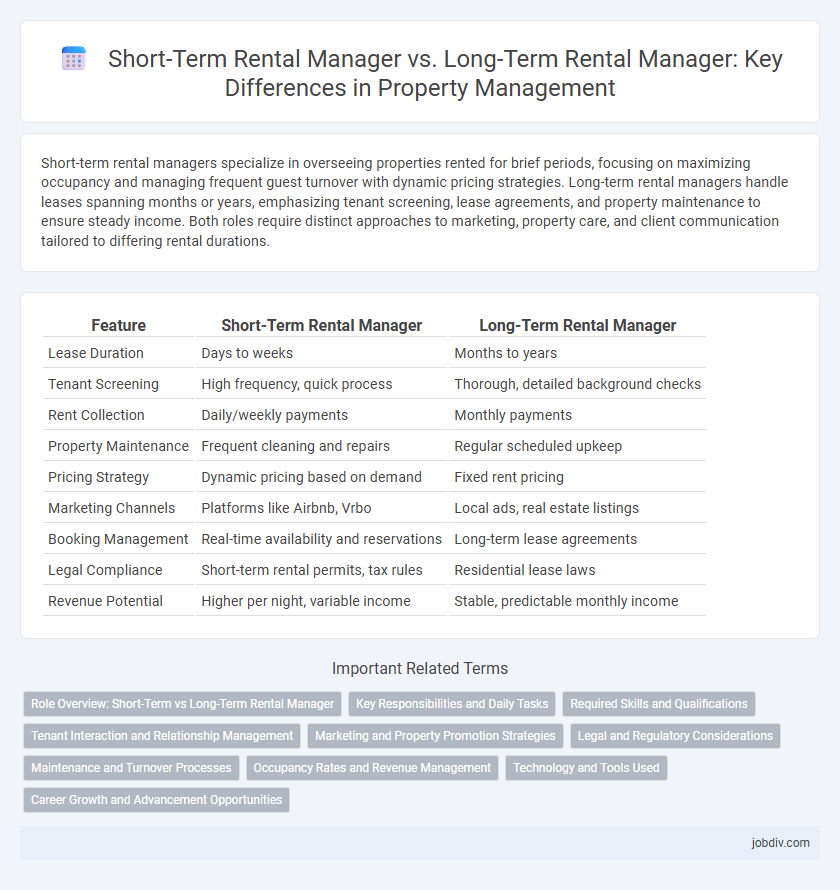Short-term rental managers specialize in overseeing properties rented for brief periods, focusing on maximizing occupancy and managing frequent guest turnover with dynamic pricing strategies. Long-term rental managers handle leases spanning months or years, emphasizing tenant screening, lease agreements, and property maintenance to ensure steady income. Both roles require distinct approaches to marketing, property care, and client communication tailored to differing rental durations.
Table of Comparison
| Feature | Short-Term Rental Manager | Long-Term Rental Manager |
|---|---|---|
| Lease Duration | Days to weeks | Months to years |
| Tenant Screening | High frequency, quick process | Thorough, detailed background checks |
| Rent Collection | Daily/weekly payments | Monthly payments |
| Property Maintenance | Frequent cleaning and repairs | Regular scheduled upkeep |
| Pricing Strategy | Dynamic pricing based on demand | Fixed rent pricing |
| Marketing Channels | Platforms like Airbnb, Vrbo | Local ads, real estate listings |
| Booking Management | Real-time availability and reservations | Long-term lease agreements |
| Legal Compliance | Short-term rental permits, tax rules | Residential lease laws |
| Revenue Potential | Higher per night, variable income | Stable, predictable monthly income |
Role Overview: Short-Term vs Long-Term Rental Manager
Short-term rental managers oversee properties rented for days or weeks, focusing on guest experience, rapid turnover, and dynamic pricing strategies to maximize occupancy and revenue. Long-term rental managers handle leases spanning months or years, emphasizing tenant screening, lease agreements, and property maintenance to ensure stable income. Both roles require expertise in property regulations, but short-term managers prioritize hospitality while long-term managers concentrate on tenant relations and contract management.
Key Responsibilities and Daily Tasks
Short-term rental managers focus on guest communication, property turnovers, and marketing across multiple platforms to maximize occupancy and revenue. Long-term rental managers handle tenant screening, lease agreements, rent collection, and maintenance coordination to ensure sustained tenancy. Both roles require strong organizational skills but differ in the frequency of guest interactions and duration of property management.
Required Skills and Qualifications
Short-term rental managers require expertise in dynamic pricing strategies, guest communication, and rapid turnover management to maximize occupancy and revenue. Long-term rental managers prioritize tenant screening, lease agreement knowledge, and property maintenance coordination to ensure stable, compliant tenancy. Both roles demand strong organizational skills, legal awareness, and proficiency in property management software.
Tenant Interaction and Relationship Management
Short-term rental managers prioritize frequent tenant communication to address immediate needs and enhance guest satisfaction, often utilizing automated messaging systems for efficiency. Long-term rental managers focus on building sustained relationships through regular maintenance updates and proactive issue resolution, fostering tenant retention over extended periods. Effective tenant interaction strategies differ significantly, with short-term managers emphasizing rapid responsiveness and long-term managers investing in personalized service and ongoing support.
Marketing and Property Promotion Strategies
Short-term rental managers leverage dynamic pricing tools and utilize platforms like Airbnb and VRBO to maximize property visibility and attract transient guests seeking flexibility. Long-term rental managers focus on targeted marketing through local listings, tenant screening, and building community relationships to ensure stable occupancy over extended periods. Both strategies require tailored promotional efforts, but short-term rentals prioritize frequent turnover and guest experience, while long-term rentals emphasize tenant retention and cost-efficiency.
Legal and Regulatory Considerations
Short-term rental managers navigate complex regulations including zoning laws, licensing requirements, and transient occupancy taxes, often facing stricter municipal enforcement compared to long-term rentals. Long-term rental managers primarily address landlord-tenant laws, lease agreements, and eviction processes governed by state and local housing regulations. Understanding these distinct legal frameworks ensures compliance and mitigates risks in both short-term and long-term rental management.
Maintenance and Turnover Processes
Short-term rental managers prioritize rapid maintenance and turnover processes to accommodate frequent guest check-ins and ensure properties are consistently clean and fully operational. Long-term rental managers focus on scheduled maintenance and minimizing disruptions to tenant occupancy, often addressing repairs during longer vacancy periods or coordinated service windows. Efficient turnover management in short-term rentals involves quick cleaning, repairs, and inspections, whereas long-term rentals emphasize preventive maintenance to extend property lifespan and tenant satisfaction.
Occupancy Rates and Revenue Management
Short-term rental managers typically achieve higher occupancy rates by leveraging dynamic pricing and frequent guest turnover, maximizing revenue through daily rate adjustments. Long-term rental managers focus on stability, maintaining consistent occupancy with monthly leases while optimizing revenue through tenant retention and gradual rent increases. Effective revenue management in short-term rentals relies on real-time market demand analysis, whereas long-term rentals benefit from strategic lease agreements and minimized vacancy periods.
Technology and Tools Used
Short-term rental managers leverage advanced property management software (PMS) and channel managers to optimize bookings across multiple platforms like Airbnb and VRBO, ensuring dynamic pricing and real-time availability updates. Long-term rental managers often use tenant screening tools, lease management software, and maintenance tracking systems tailored for extended stays and stable occupancy. Both employ digital communication platforms and financial automation tools, but short-term managers prioritize guest experience technologies, while long-term managers focus on compliance and tenant retention solutions.
Career Growth and Advancement Opportunities
Short-term rental managers often experience faster career growth due to the dynamic nature of managing multiple properties with high turnover rates, which enhances skills in marketing, guest relations, and technology use. Long-term rental managers develop expertise in tenant relations, property maintenance, and lease management, which can lead to stable advancement opportunities within property management firms or real estate agencies. Choosing between the two career paths depends on preference for rapid skill development versus steady progression in property oversight and tenant services.
Short-Term Rental Manager vs Long-Term Rental Manager Infographic

 jobdiv.com
jobdiv.com